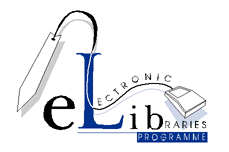HEADLINE - Hybrid Electronic Access and Delivery in the Library Networked Environment
- Project web site
- http://www.headline.ac.uk/
- Programme area
- Hybrid Libraries
- Contact details
-
Maureen Wade, Sub-Librarian (Information Services & Collection Development)
British Library of Political & Economic Science, (London School of Economics), 10, Portugal Street, London WC2A 2HD
tel: 0171 955 7224
Fax: 0171 955 7454 e-mail: M.Wade@lse.ac.ukJohn Paschoud, Project Manager, HEADLINE
British Library of Political & Economic Science, (London School of Economics), 10, Portugal Street, London WC2A 2HD
tel: 0171 955 6129
Fax: 0171 955 7454 e-mail: J.Paschoud@lse.ac.uk
Project description
as of April 16th 1998
Introduction
The overall aim of the project is to develop and implement a working model of the hybrid library in a range of real-life academic situations. There is a strong emphasis on managing the presentation of resources to the user and on integrating a wide range of both resources and delivery options. The subject coverage of the project will be economics, finance, business and management but the model is intended to be widely applicable and the consortium elements to be readily scalable to larger groupings of libraries.
Description
HEADLINE plans to address a good cross-section of the teaching, learning and research situations to be found in UK higher education. The resource components of the hybrid library model are the real-world objects with which the library works: the catalogues, databases, applications, electronic services, Web resources etc These are the building blocks for the hybrid library. The model is intended to be widely applicable, both in terms of subject areas and types of academic institution. The initial test-bed for development will be based around economics, finance and business information which are of interest to all consortium partners. The commercial value of much of the data in these subject areas has meant that suppliers have found it worthwhile to make substantial investments in making the data available electronically using a variety of access media and delivery methods, which range from proprietary Windows interfaces to Web-based products.
The model proposed for the hybrid library is user-centred, and the fundamental design concept is that the user operates within a user-dependent managed web environment. The system has access (via the login process) to the user's administrative details - status, subject area, registered courses etc. - and uses this information to provide a tailored and supportive environment. The system retains feedback from the user' s actions, providing a mechanism for the user profile to develop with time. Thus the environment is capable both of responding to the deliberate choices on the part of the user, and of offering new resources (based on subject-linked metadata) as the user extends his/her explorations. Information delivery formats will range from electronic to print to conventional ILL or order process.
Key deliverables
- Establishment of a working model for consistent access to library materials regardless of physical form, transferable across broad subject disciplines and a range of different higher education situations.
- Development of a user-dependent dynamic web environment within which to manage individual access to the resource base.
- Mechanisms for incorporating user feedback and evaluation in the design, content and delivery of the service.
- Exploration of licensing and copyright issues involved in providing access to the broad range of hybrid library materials
- Implementation of the hybrid library model in a real-life environment, using tools and technologies already widely available to the academic library community.
- Continuous dissemination of results and progress of the project.
Participants
The project will be led by the London School of Economics with partners at the London Business School and the University of Hertfordshire. Development work will be carried out at the LBS and the LSE, with all three sites acting as test-beds and contributing to user studies, both in terms of initial user requirements and user evaluation and feedback. The involvement of commercial partners will

